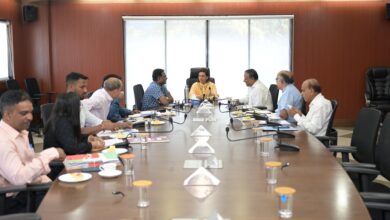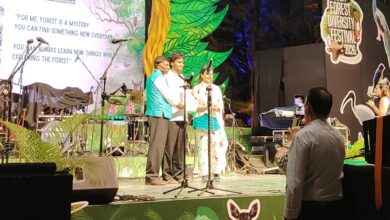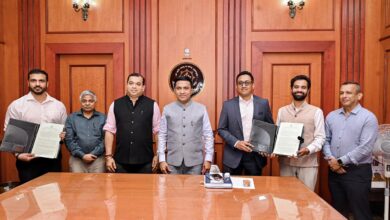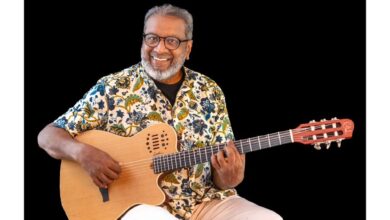
Two Worlds, One Rhythm: Vishal Bhardwaj & B. Ajaneesh Loknath Honour Lata Mangeshkar’s Legacy
Vishal Bhardwaj’s Musical Anecdotes and Heartfelt Lataji Memories Charms Audience
Ajaneesh Captivates with his Experiements in Folk Music
23 November 2025: The Annual Lata Mangeshkar Memorial Talk at IFFI, titled “The Rhythms of India: From the Himalayas to the Deccan,” unfolded like a vibrant musical journey, weaving together memory, melody and the magic of creation. With music composers Vishal Bhardwaj and B. Ajaneesh Loknath in conversation and critic Sudhir Srinivas steering the dialogue, the session offered the audience a rare chance to witness two distinctive musical minds open their creative worlds.
The evening began on a warm note as filmmaker Ravi Kottarakkara felicitated the speakers, calling music a force that lifts us up and binds us together. His words gently ushered in a conversation that was equal parts reflective, humorous and deeply musical.
Admiration, Influence and Iconic Themes
Sudhir set the tone immediately, reminding the audience that Ajaneesh is “much more than the ‘Kantara’ composer,” and that between him and Vishal, the room held “the past, present and future of Indian music.” From there, the discussion blossomed into a heartfelt exchange between two artists who have long admired each other’s work.
Vishal spoke first, calling the ‘Kantara’ theme “one of the finest film themes ever composed,” and admitting it compelled him to seek out the composer behind it. Ajaneesh responded with a smile and a memory: ‘Maachis,’ Chappa Chappa, and the unmistakable rhythmic “swing” of Vishal’s music that had shaped him since childhood. He even hummed a bit of the rhythm to a delighted audience.
When the conversation moved to ‘Pani Pani Re,’ the room leaned closer. Vishal described how the sound of water and the silence of a riverbank defined the song’s soul. He recalled Lata Mangeshkar’s instinctive perfection, how she remembered every note, sang in a single take, and even suggested adjustments in the tune to mirror the flow of water. “She wasn’t just a singer,” he said. “She was a composer in her own right.”
Inside the Composer’s Mind
Ajaneesh then offered a glimpse into his own quirky process. He talked about how expressive syllables like ‘ayyayyo’ and ‘abbabba’ often creep into his tunes to convey emotion before lyrics arrive. Directors, he laughed, almost always insist on keeping them. His anecdote about the pressure-filled final days of composing ‘Varaharoopam’ 20 days before release drew amused reactions from the audience.
The talk took a philosophical turn when Sudhir asked why musicians often speak of a spiritual force in creativity. Vishal answered with characteristic clarity: “The closest we come to silence is music.” He spoke of the mysterious, almost sacred arrival of a tune, something he believes comes “from somewhere else.” Ajaneesh agreed, saying he has never fully understood how he enters the creative state, and that he has never credited himself for ‘Kantara.’
Language, Folk Traditions and India’s Sonic Landscapes
The session then explored the intricate interplay between language and music. Ajaneesh spoke of how the ‘Karma’ song connected universally, while other songs rooted in cultural nuance do not always travel the same way. Vishal recalled his experiences composing in Malayalam, working with MT Vasudevan Nair and ONV Kurup, and the fascinating challenges of composing in a language he did not fully know.
Folk music took centre stage next. Ajaneesh described folk as “born from innocence,” explaining how ‘Kantara’ relied entirely on tribal instruments until its climactic fusion. He illustrated India’s rhythmic diversity with the example of Koraga communities that communicate via distinct dhol patterns. Vishal added that India contains “many cultures,” each with its own dialects, textures, folk traditions and musical signatures.
Future of Music: AI, Lyrics and Storytelling
As the session opened for questions, discussions flowed from lyrics and storytelling to AI and the future of music. Ajaneesh said AI may help in certain contexts, while Vishal reminded the audience that technology must not be feared: “We will learn what to use and what to leave.”
In the end, the Memorial Talk did more than honour the Nightingale of India. It traced the sweeping landscape of Indian music, from classical to folk, from personal memories to spiritual reflections, and allowed the audience to witness creativity in its most candid form. It was a tribute not just in name, but in spirit: a celebration of rhythm, culture, memory and the endless melodies that shape the Indian imagination.









